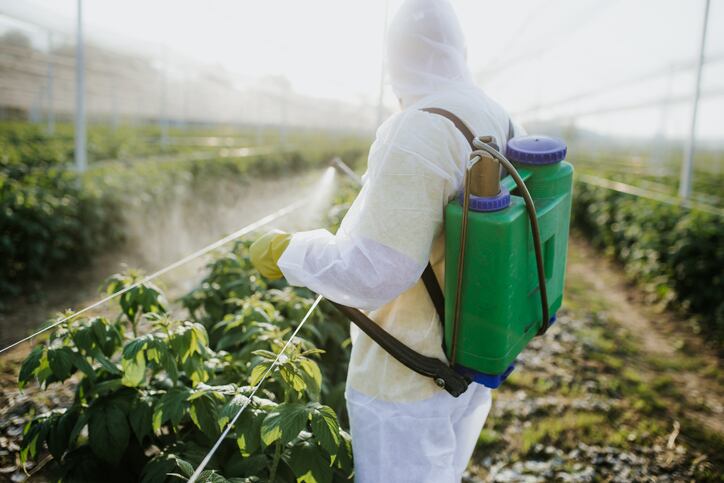Glyphosate – the most widely used herbicide in the world – is currently authorised for use in the EU until December 2022, though it remains controversial.
In 2015, the World Health Organization’s (WHO) cancer agency, the International Agency for Research on Cancer (IARC), issued an infamous report concluding that glyphosate is ‘probably carcinogenic to humans’.
Environmental groups such as Friends of the Earth Europe add that glyphosate has a detrimental effect on biodiversity, soil health and water quality, as well as adverse consequences for wildlife. In particular, spraying with glyphosate has been linked to declining bee populations.
Subsequent studies by the European Food Safety Authority (EFSA) and the European Chemical Agency (ECHA) have concluded that there is not enough evidence to support the link between glyphosate and cancer risk. Meanwhile, various member states – including France and Germany – have since taken action on a national level to limit or ban its use, and some manufacturers have done the same. Last year, the Kellogg Company confirmed it will phase out the use of glyphosate as a drying agent in its wheat and oat supply by 2025.
But now, national authorities of France, Hungary, the Netherlands and Sweden – known as the Assessment Group of Glyphosate (AGG) – have examined all the evidence submitted by the companies that are seeking renewed approval to market the substance in the EU.
The AGG’s draft report, which runs to around 11,000 pages, concluded “glyphosate cannot be classified as a carcinogen,” adding: “The drug can cause serious eye damage, but it is not carcinogenic, has no effect on the sex cells and does not affect reproduction.”
The next step is for the EFSA and the European Chemicals Agency (ECHA) to organise consultations on the draft report, which will be open to the public and will be launched in the first week of September this year.
The AGG ultimately wants to see the authorization of glyphosate extended beyond 2022 in the EU: a position backed by Bayer. The chemical giant said: “The AGG's conclusions are in line with the conclusions of leading health authorities around the world. For more than 40 years, leading health authorities have repeatedly concluded that glyphosate-based products are safe to use according to label instructions and that glyphosate is not a carcinogen.”
Health campaigners said the AGG's assessment should be taken with a pinch of salt. The Union for International Cancer Control reiterated that a study conducted in 2015 by the IARC reaches a different conclusion.
“With potentially risky products such as glyphosate, we feel that it is necessary to proceed with caution and ensure consumer safety first than be forced to play ‘catch-up’ later. Therefore, we would urge further study before reaching any conclusions that can influence policy in an adverse way,” said UICC CEO Dr Cary Adams.
A spokesperson from Foodwatch said the ICC findings provide “clearly enough ground for decision makers in the EU to simply implement the precautionary principle” and called on the EU to “have the political courage to protect as a priority public health and not to renew the authorization for glyphosate at the end of 2022.”
Brussels-based campaign group Corporate Europe Observatory (CEO) added the EU’s glyphosate assessment is based on flawed science. It claims its own new scientific analysis of the 53 industry-funded studies used for the EU’s current authorization of glyphosate reveals that 34 were identified as "not reliable", 17 as "partly reliable" and only 2 studies as "reliable" from a methodological point of view.
Angeliki Lyssimachou, Environmental Scientist at the Health and Environment Alliance, a CEO ally, said: "This new scientific analysis shows yet again that the European Union's claim to having the most rigorous pesticide authorization procedure in the world has to be taken with a heavy grain of salt. The authorization procedure in place is evidently not rigorous enough to detect errors in the execution of the regulatory studies that are blindly considered the gold standard. Yet these were at the heart of the 2017 EU-market approval of glyphosate, and they have now been submitted again in an effort to water down scientific evidence that glyphosate may cause cancer and is a danger to human health."


